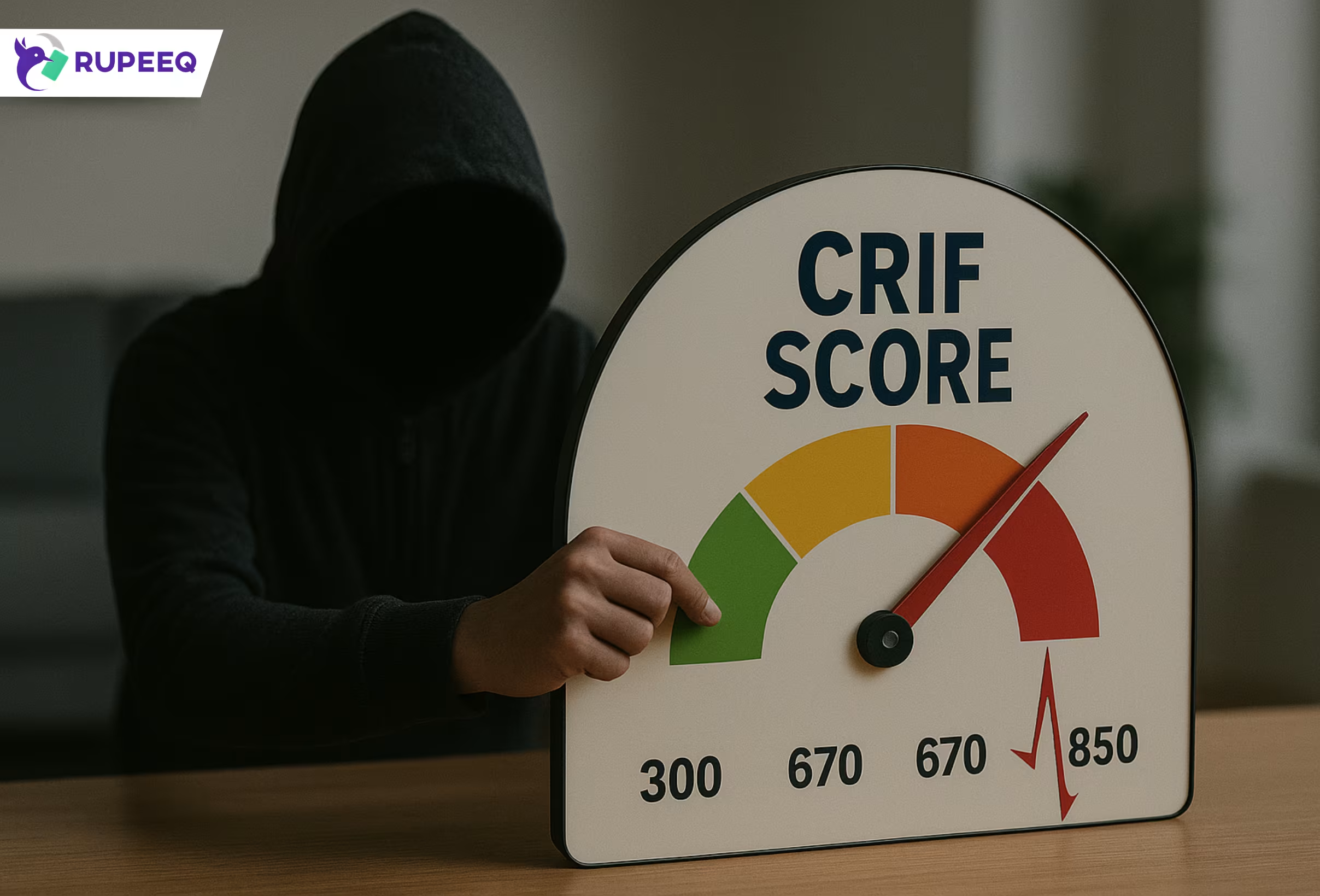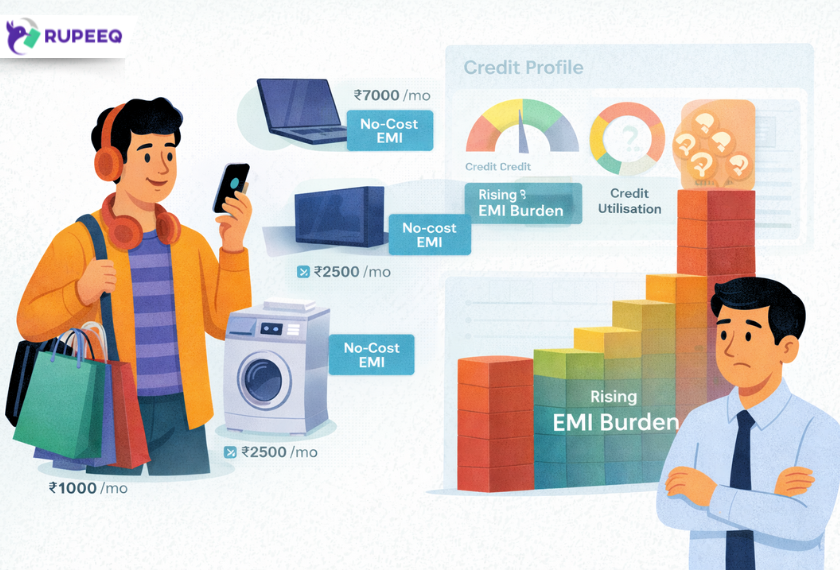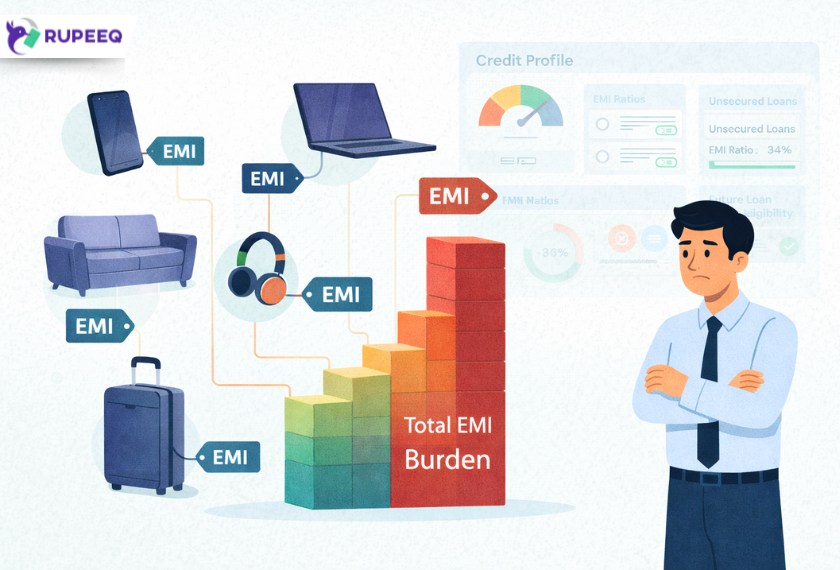When it comes to maintaining a good credit score, most people think about timely EMI payments or low credit utilization. However, one critical factor that can silently damage your score is financial fraud. Whether it’s a fake loan taken in your name or an unauthorized transaction that affects your repayment history, such incidents can have a long-lasting impact on your CRIF credit score.
This blog explores how financial fraud can harm your CRIF score, what signs to watch for, and how RupeeQ can help you detect and manage such risks.
What Is Financial Fraud in the Context of Credit Reports?
Financial fraud, when related to credit reports, refers to unauthorized or deceptive financial activities that affect your credit profile. These may include loans or credit cards taken without your consent, incorrect information updated in your report, or fraudulent repayment history recorded by lenders.
Even a single case of fraud can trigger a negative entry in your CRIF credit report, leading to a lower score and reduced loan eligibility.
How CRIF Credit Score Is Calculated and Why Accuracy Matters
Your CRIF score is based on various factors like:
- Repayment history
- Loan types and amounts
- Credit utilization
- Number of credit inquiries
- Existing loan balances
All this data is collected from financial institutions and updated in your credit report. If any part of this information is incorrect due to fraud, it may falsely indicate financial mismanagement.
For example, if a fraudster takes a loan using your PAN or Aadhaar and doesn’t repay, CRIF sees it as your missed EMI—even if you were unaware of the loan.
Common Types of Financial Fraud That Affect CRIF Score
Here are some common ways in which financial fraud can impact your CRIF score:
1. Identity Theft
A fraudster may use your identity to take loans or credit cards. Since repayments aren’t made, the loan turns delinquent and your score drops.
Impact: A sudden drop in credit score and rejection of future loan applications.
2. Incorrect Reporting by Lenders
Sometimes, lenders make unintentional errors, like wrongly tagging a paid account as “defaulted” or listing an account you never opened.
Impact: Incorrect default status or account information can drag your score down by 50–100 points.
Each loan or credit card application results in a hard inquiry. If someone applies using your documents, your report will reflect multiple inquiries in a short period.
Impact: Excessive inquiries reduce your creditworthiness, making you look like a high-risk borrower.
4. Account Duplication
If your data is duplicated or mismatched (e.g., similar name, incorrect PAN), two accounts may be reported in your name.
Impact: Loan eligibility may decrease due to inflated liabilities.
5. Wrong Settlements or Write-Offs
If your name is mistakenly marked as a defaulter or if a fraudulently taken loan is written off under your name, it reflects poorly on your CRIF report.
Impact: Banks will treat you as high-risk and charge higher interest or reject your application.
RupeeQ Tip: Regularly check your credit report from RupeeQ’s Free Credit Score section. It helps you spot suspicious entries early and dispute them before they impact your loan approvals.
Signs That Your CRIF Score May Be Affected by Fraud
Here are signs you should not ignore:
- Drop in credit score despite regular repayments
- Loans or credit cards showing up that you never applied for
- Repayment delinquencies listed incorrectly
- Lenders making calls about unknown loans
- Unexpected rejection of loan or credit card application
How to Fix Your CRIF Score If It’s Affected by Fraud
If you suspect fraudulent activity in your credit report, here’s what you should do:
1. Obtain Your Latest CRIF Credit Report
You can check your credit report for free through RupeeQ. Identify any errors or unfamiliar entries.
2. Raise a Dispute with CRIF
CRIF allows users to raise a dispute through their official portal. You’ll need to:
- Identify the specific error
- Submit proof (e.g., ID documents, payment receipts)
- Track your complaint status online
Resolution may take 15–30 working days depending on the complexity.
3. Notify the Respective Lender
Inform the bank or NBFC where the incorrect data has originated. Often, lenders can expedite corrections faster than the bureau.
4. File a Cyber Fraud Complaint
If fraud is confirmed, register a complaint at the Cyber Crime Portal (cybercrime.gov.in) and keep the complaint ID for future reference.
5. Recheck Your Score After Rectification
Once the bureau and lender confirm corrections, monitor your CRIF score again. It should reflect the accurate status within 30 days.
How RupeeQ Helps You Detect and Respond to Fraud Faster
RupeeQ goes beyond just showing your credit score. Here’s how we help protect your CRIF profile:
- Real-time access to CRIF score and report
- ACE – Advanced Credit Evaluation tool to highlight hidden issues
- Regular insights into score changes and reasons behind them
- Direct pathways to raise disputes or connect with financial institutions
You don’t have to be a financial expert to manage your credit health—RupeeQ does the heavy lifting.
Conclusion
Financial fraud is not just a cybersecurity issue—it can directly harm your financial reputation. Even if you have done nothing wrong, someone else’s actions can cause your CRIF score to drop, affecting your chances of getting loans, credit cards, or even job offers in finance sectors.
Stay alert, check your credit report regularly, and act fast if you see anything suspicious. With RupeeQ’s tools and CRIF score check, staying credit-healthy is just a few clicks away.







